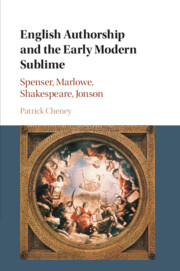
- Cited by 6
-
Cited byCrossref Citations
This Book has been cited by the following publications. This list is generated based on data provided by Crossref.
Bednarz, James P. 2020. John Marston and the Revolution at Paul’s Playhouse (1599–1601). Modern Philology, Vol. 118, Issue. 1, p. 1.
Archer, Harriet and Wood, Richard 2020. VI The Sixteenth Century: Excluding Drama after 1550. The Year's Work in English Studies, Vol. 99, Issue. 1, p. 320.
McEvilla, Joshua Wilkinson, Kate Cryar, Jennifer Jenny Ragni, Cristiano and Equestri, Alice 2020. VIII Renaissance Drama: Excluding Shakespeare. The Year's Work in English Studies, Vol. 99, Issue. 1, p. 454.
Montori, Irene 2020. Representing Creation, Experiencing the Sublime: The Longinian Tradition in Tasso and Milton. Sederi, p. 69.
Trudell, Scott A. 2020. Shakespeare's Notation: Writing Sound inMuch Ado about Nothing. PMLA/Publications of the Modern Language Association of America, Vol. 135, Issue. 2, p. 370.
Tregear, Ted 2021. Marvels and Commonplaces in the Elizabethan Anthologies. Classical Receptions Journal, Vol. 13, Issue. 1, p. 49.
- Publisher:
- Cambridge University Press
- Online publication date:
- March 2018
- Print publication year:
- 2018
- Online ISBN:
- 9781107279100




